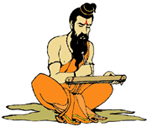|
|
|
|
Mantras
are considered to be divine rhymes composed by
the ancient Indian saints in the divine language
of Sanskrit. When recited properly they protect
human from different malefic effects of other
evil elements. Similarly mantras
corresponding to different planets when recited
properly is considered to protect the person
from the bad effect of that planet.
|
Mantra
(Shabda or Sound) is said to be the phonetic
manifestation of the Supreme Reality. A Mantra is
composed of certain letters arranged in definite
sequence of sounds. Mantra is a potent compelling force
and is used for many purposes, divine and mundane. It is
said that the Guru or the Adept is the best person to
find out the Mantra suitable for the Seeker. However,
interestingly, astrology too has an elaborate system of
judging whether a particular Mantra will be suitable for
a Sadhaka.
|
|
The
power of Mantras & Shlokas has been
acknowledged since time immemorial. A Mantra can consist of a powerful word or a
combination of words and can be used for self
realization, for freedom from worries, to fulfill
one's desires, to ward off the effects of malefic
planets, to bring you success, peace and
contentment -- the range is truly vast. You can
choose for yourself. |
|
|
|
|
|
|
|
The
Mantric Approach of the Vedas |
 |
The
Vedas are mantric teachings. They consist of
various mantric chants or hymns cognized by
different seers or Rishis from the Cosmic Mind.
They set forth Dharma or natural law, which is
mantra in manifestation. As such the Vedas are
impersonal and eternal, just as cosmic law cannot
vary. This same mantric knowledge gives rise to
different sciences (vidyas) according to the angle
of vision with which we approach it. Ayurveda,
Vedic Astrology, Yoga, and Vedanta all arise from
it and represent different ways of looking through
it. |
|
|
The
Vedic language is based upon an earlier more
primordial language of seed (bija) mantras. These
are single syllable sounds or roots like OM that
have multiple meanings and indications depending
upon their intonation and the intention with which
they are used. Out of the bija or root language
arises the language of the Vedic texts, which is
already differentiated, though not fully, into
nouns and verbs. These bijas are explained more in
Tantra, which in its true sense (apart from
current popular distortions) is also a science of
the Divine Word.
To
introduce the reader to the Vedic mantric approach
we will introduce a few important bija mantras and
then the main Vedic chant, the Gayatri mantra, of
twenty four syllables. This will also help the
reader understand the vision behind the Vedic
Studies. It is all a manifestation of the
mantra.
Click
here to read details of five main Bija
Mantras
|
|
|
|
More
About Mantras
|
|
Mantras must be chanted or recited with unwavering
devotion and motivation. Chanting them as a
matter-of-course deprives them of power and is
practically useless from the point of view of
conscious growth, evolution and effect.
Click
here to read more ..
|
|
|
The
Gayatri Mantra, the Essence of the Vedas |
|
This
great mantra consists of three parts. The first is the
chants to the seven worlds. The second is the mantra
proper of twenty-four syllables. The third is a summary
of the mantra's energies.
Click
here to read the complete article.. |
|
|
|
|
|
|
|
|
|